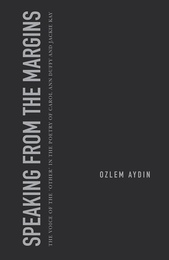Speaking from the Margins: The Voice of the ‘Other’ in the Poetry of Carol Ann Duffy and Jackie KayPosted in Books, Literary/Artistic Criticism, Media Archive, Monographs, United Kingdom, Women on 2011-09-08 02:29Z by Steven |
Speaking from the Margins: The Voice of the ‘Other’ in the Poetry of Carol Ann Duffy and Jackie Kay
Academica Press
2010-06-15
124 pages
Trim Size: 6 x 9
Cloth ISBN: 978-1-933146-92-8/ 1933146-92-3
Özlem Aydin
Speaking from the Margins: The Voice of the ‘Other’ in the Poetry of Carol Ann Duffy and Jackie Kay studies Carol Ann Duffy and Jackie Kay as poets who identify and represent some key forms of “otherness” may take in the British society of the 1980s and the 1990s. Indeed, although Duffy’s poetry is political and concerned with the British society of the 1980s and the 1990s, particularly with the condition of the underprivileged and people pushed to the margins of society as a result of Thatcherite policies, criticism of her poetry is more concerned with her feminist representation of gender in her work. Thus, it is important that her poetry of the 1980s and the 1990s is recognised as a poetry of the “other” as Duffy in this poetry gives specifically a panorama of Thatcherite Britain through the voice of the “other”. Similarly, this thesis analyses Jackie Kay’s poetry as a poetry which is critical not only of Britain but also is particularly concerned with the condition of the racial and the sexual other in the 1980s and the 1990s Britain. Although “The Adoption Papers” has often been discussed and analysed mostly by focusing on the issues of identity and adoption, “Severe Gale 8”, the sequel to “The Adoption Papers”, Other Lovers and Off Colour have not been the focus of much academic study from the aspect of the voice given to the racial and the sexual other.
This research monograph studies Jackie Kay and Carol Ann Duffy as poets representing the voice of the “other” in the 1980s and the 1990s British society because there is a considerable lack of criticism on this particular aspect of their poetry. The works of these two poets are part of contemporary British poetry in which as Kennedy puts it “the heterogeneity of the ‘ex-centric’, the marginal and the peripheral is raided in order to revitalise and refurbish the homogeneity of the centre. Diversity is used to underwrite a new uniformity” (“Mapping Value”).
- Introduction
- Overview of the 1980s and the 1990s poetry scene in the United Kingdom given to serve as a background framework for the poetry of the two poets under study.
- Part I: The Voice of the “Other” in the Poetry of Carol Ann Duffy
- After a brief introduction to the social and economic background of contemporary British society and its impact on the poetry of the 1980s and the 1990s, the voice of the “other” in selected poems of Carol Ann Duffy from her poetry collections Standing Female Nude (1985), Selling Manhattan (1987), The Other Country (1990) and Mean Time (1993) will be studied in Chapter I.
- Part II: The Voice of the “Other” in the Poetry of Jackie Kay
- The poetry of Jackie Kay from The Adoption Papers (1991), Other Lovers (1993) and Off Colour (1999) are studied closely with respect to the racial and sexual “other” she represents concerning the voice of the other in society.
- Conclusion
- The study of the relevantly selected poetry of Carol Ann Duffy and Jackie Kay shows that Duffy, through her use of the dramatic monologue, and Kay, by using her own experiences present the voice of the “other” in their poetry. Duffy gives voice to the outcasts in the society such as the criminal, the mentally ill, the rejected, the silenced, the marginalized, the unemployed and the immigrant, and Kay herself already an “other” as a black girl adopted and raised by a Scottish family deals with racial issues, racial and sexual otherness in contemporary Britain. Both Duffy and Kay have their poetry represent the contemporary Britain through the experience and voice of the “other”.

